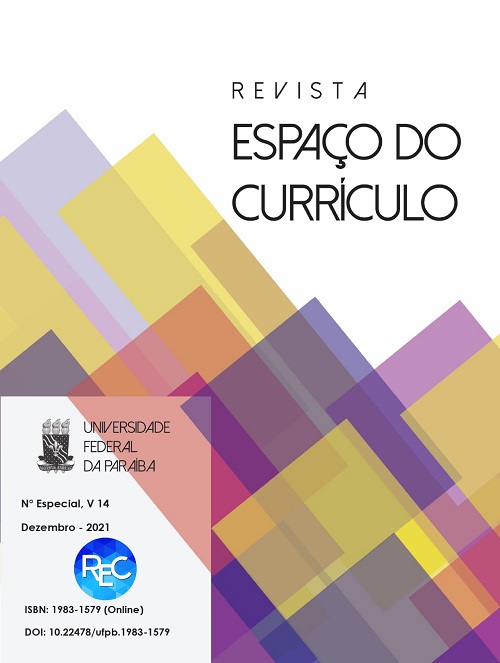CURRICULAR THEORIES
a reading of their foundations and meanings
DOI:
https://doi.org/10.15687/rec.v14iEspecial.57068Keywords:
Curriculum, Curriculum theories, EducationAbstract
The objective of this article is to understand the curricular theories and their meanings for the curricula in the school community, in face of this proposition; we were instigated to know to which intentionalities the curricular theories advocate and their influences on education and teaching. In the methodological procedures, we followed a qualitative approach, with a dialectical method, in a bibliographical study. We seek to dialogue in the studies of Kliebard (2011), Silva (2010), Freire (2000), Arroyo (2013), Giroux (1997), Lopes and Macedo (2011) among others, their foundations resuming the look on the traditional aspects of curriculum, the critical perspective and post-structuralism. The reflections in this study highlight the relevance of knowing the curriculum theories in its historical process in a socio-political-cultural trajectory, because this knowledge enables the understanding of the dynamics of educational reality and is necessary in formative spaces in which we seek to know their foundations and meanings that help us understand the relationships established in everyday school, which is made through ideological discourses and knowledge-power.
Downloads
Metrics
References
ARROYO, Miguel G. Currículo-Território em Disputa. Petrópolis-RJ: 5ª ed. Vozes. 2013. p.9-374
BURITY, J. Psicanálise, identificação e formação de atores coletivos. Recife: Instituto de Pesquisas Sociais, Fundação Joaquim Nabuco, 1997. Disponível em: http:/̸ biblioteca.clacso.edu.ar̸ Brasil, 2014.
DERRIDA, J. Posições. Belo Horizonte. Autêntica, 2001.
DIAS, R. E, LOPES, A.C. SENTIDOS DA PRÁTICA NAS POLÍTICAS DE CURRÍCULO PARA A FORMAÇÃO DE PROFESSORES. Currículo sem Fronteiras, v.9 n.2, p.79-99, jul/dez 2009.
FREIRE, P. Pedagogia da autonomia: saberes necessários à prática educativa. 31. ed. São Paulo: Paz e Terra, 2005.p. 3-90
FREIRE, P. Pedagogia do oprimido. 35. ed. Rio de Janeiro: Paz e Terra, 2003. p. 184
FOUCAULT, M. A. Ordem do Discurso. Tradução de Laura Fraga de Almeida Sampaio. São Paulo: Edições Loyola, 2004. p.80
GARCIA, Regina Leite; MOREIRA, Antônio Flavio Barbosa (Org). Currículo na contemporaneidade: incertezas e desafios. São Paulo: Cortez, 2006.p.344
GATTI, Bernadete. A.; BARRETO, E. S. de S.; ANDRÉ, Marli. E. D. de A. Políticas docentes no Brasil: um estado da arte. Brasília: UNESCO, 2011.
GIROUX, Henry "Rumo a uma nova sociologia do currículo" In: GIROUX, Henry. Os professores como intelectuais – rumo a uma nova pedagogia crítica da aprendizagem. Porto Alegre: Artes Médicas, 1997, p. 43-53 (cap. 2)
LACLAU, E. MOUFFE, C. Hegemony and socialista strategy. Londres: [s.n.] 1985. p. 179
LOPES, Alice Casimiro; MACEDO, Elizabeth. Teorias De Currículo. São Paulo: Cortez, 2011. P. 280
LOPES, Alice C., CUNHA, Erika V. R. da COSTA, Hugo H. C. DA RECONTEXTUALIZAÇÃO À TRADUAÇÃO: investigando políticas de currículo. Currículo sem Fronteiras, v. 13, n. 3, p. 392-410, set./dez. 2013
KLIEBARD, Herbert, M. Os princípios de Tyler. Currículo sem Fronteiras, v.11, n.2, pp.23-35, Jul/Dez 2011.
KLIEBARD, Herbert, M. Burocracia e teoria de Currículo. Currículo sem Fronteiras, v.11, n.2, pp.5-22, Jul/Dez 2011.
MACEDO, Roberto Sidnei. Etnopesquisa crítica, etnopesquisa-formação. Brasília: Liber Livro Editora, 2006.p.178
MOREIRA, Antônio Flávio Barbosa (Org.). Currículo: questões atuais. 7ed. Campinas, SP: Papirus, 2003. p.192
PETERES, M. Pós-estruturalismo e filosofia da diferença. Uma introdução. Tradução de Tomaz Tadeu da Silva. Autêntica: Belo Horizonte, 2000.p.84-91
SANTOS, F.S. S. dos. Professores dos anos iniciais do ensino fundamental, pedagogia histórico-crítica e ensino de ciências: investigando articulações. p. 1-87. Dissertação - Programa de Pós-Graduação em Educação para a Ciência. Bauru-SP. 2015
SILVA, Tomaz Tadeu da. Documentos de identidade: uma introdução às teorias do currículo. 2ª ed. Belo Horizonte: Autêntica, 2010.p.158
Downloads
Published
How to Cite
Issue
Section
License
Copyright (c) 2021 Curriculum Space Journal

This work is licensed under a Creative Commons Attribution 4.0 International License.
By submitting an article to Curriculum Space Journal (CSJ) and having it approved, the authors agree to assign, without remuneration, the following rights to Curriculum Space Journal: first publication rights and permission for CSJ to redistribute this article. article and its metadata to the indexing and reference services that its editors deem appropriate.
















